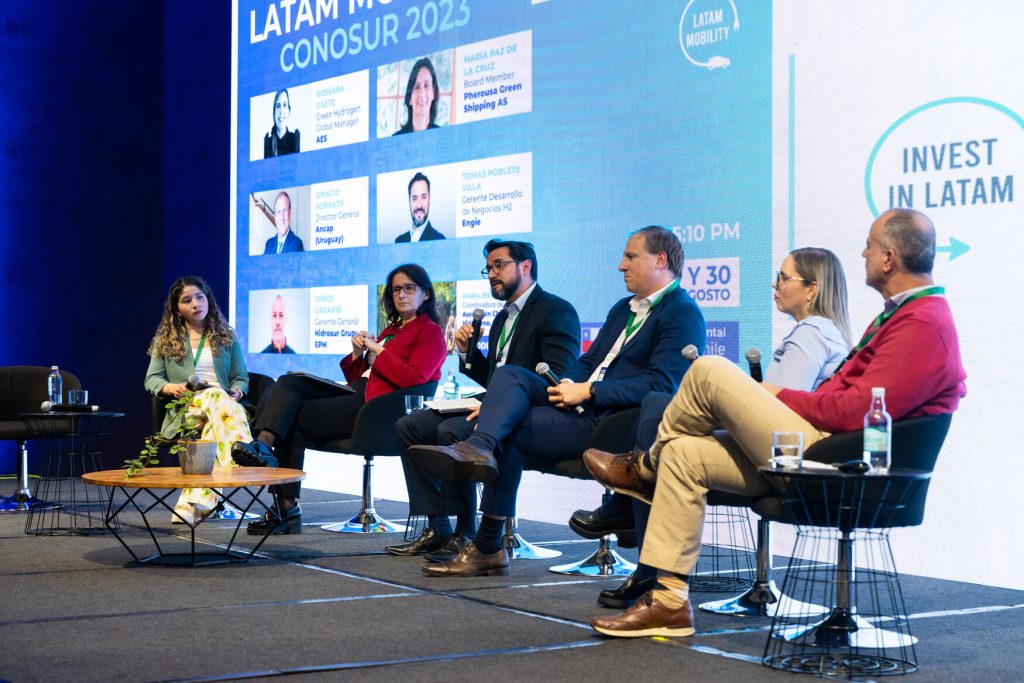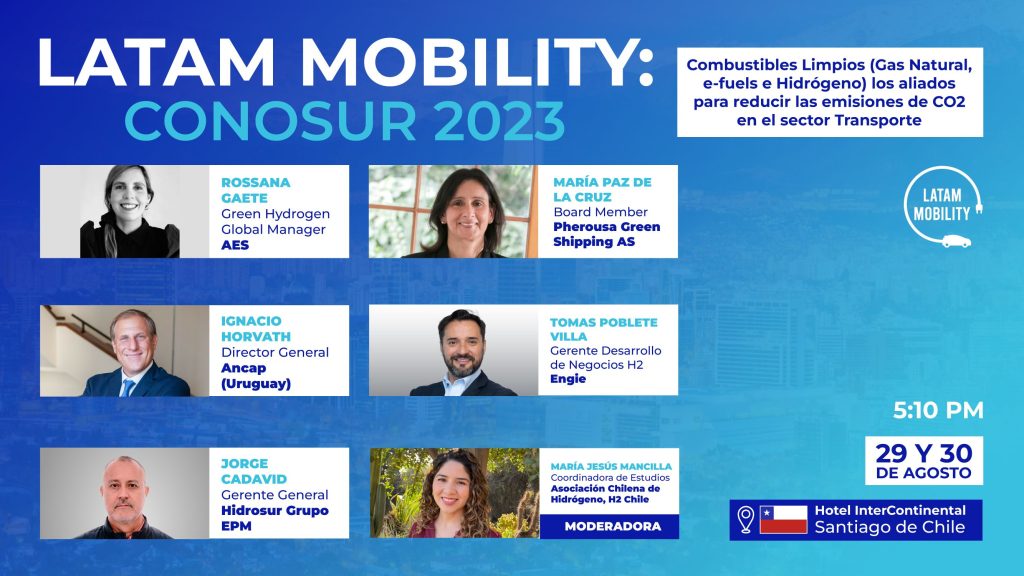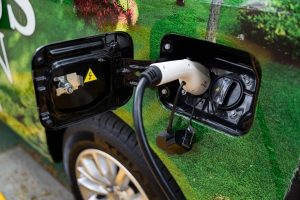
Ancap, AES, Engie, EPM and Pherousa Green Shipping Discuss the Relevance of Clean Fuels in the Transport Sector

The meeting “Latam Mobility: ConoSur 2023” addressed multiple topics related to mobility and sustainability, including the panel “Clean Fuels (Natural Gas, e-fuels and Hydrogen): Allies to Reduce CO2 Emissions in the Transport Sector“, as a basis for addressing the challenge of decarbonization of a sector that accounts for about 40% of total greenhouse gas emissions in the region.
The panel, organized by Latam Mobility, the largest mobility community in Latin America, was attended by: Rossana Gaete, Green Hydrogen Global Manager of AES; Tomás Poblete Villa, H2 Business Development Manager of Engie; Ignacio Horvath, General Manager of Ancap (Uruguay); María Paz de la Cruz, Board Member of Pherousa Green Shipping, and Jorge Cadavid, General Manager of Hidrosur of the EPM Group, under the moderation of María Jesús Mancilla, Studies Coordinator of H2 Chile.
You may also be interested in: Autel, Blink Charging, Enel X Way, Enerlink and EPM are ready to lead the transition to electromobility in Latin America
Solutions and Needs
The panel began with María Paz de la Cruz, board member of Pherousa Green Shipping, a Norwegian maritime company, which recently ordered the construction of six ammonia-powered cargo ships to transport minerals from Chile; and also advisor to Marval, a logistics operator that “is in a strong process of transformation, which seeks to become a green services company, has acquired some forklifts and hydrogen fuel trucks are in plans”.
In relation to technological solutions in maritime transport, Paz said: “Decarbonizing the sector is one of the great challenges, so we are working with a somewhat hybrid technology that uses a conventional engine powered by ammonia, as well as another that releases hydrogen to be used in fuel cells. Even methanol is being used, but when we are talking about long distances, conventional engines are more important.
Among the needs, Marval‘s representative pointed out that a system to homologate and certify the fuel coming out of Latin America is necessary. “Certain requirements must be met, minimum principles, social and environmental licenses, to position a renewable product that really contributes to climate change. That certification is not only to ensure environmental and sustainability standards, but also social standards, to link the direct benefit in the territories where the projects and new technologies are developed.”

The Walmart Example
The panel was attended by Tomás Poblete, Business Development Manager of Engie, a French company focused on electricity generation, storage and gas supply networks. “In the world, we have an important participation: we have 33% of our renewable generation matrix with photovoltaic panels, and an interesting plan for 2030 to have 4 Gw installed. For us, Chile is a strategic country because of all the conditions in natural terms.”
Recently, Walmart inaugurated the first green hydrogen plant for industrial use in Chile, and the Engie executive indicated that it is an interesting and integrating project. “We installed an electrolyzer of 650 kilos, with a production capacity of 260 kilos/day. In addition, 200 cranes were retrofitted. This technology reduces loading times per crane from 30/32 to 1.82 minutes, an important saving in terms of availability, mobility for hoisting versus loads, and delivery performance.”
On the other hand, Poblete pointed out the importance of collaborative work. “We should not focus only on the comparative range with respect to fossil fuels, we must understand all the variables involved and put others on the table. At Engie we believe in the social benefit of these technologies, in the needs that exist in green hydrogen, and for this reason, we are moving forward together with other companies on the road to decarbonization.”
The methanol route
Ignacio Horvath, General Director of the National Administration of Fuels Alcohol and Portland of Uruguay (ANCAP), explained that in 2022, the Uruguayan state-owned oil company had 4 billion dollars in turnover; with exploration, production and midstream businesses; natural gas, lubricants, cement, and others, with an extensive portfolio and a major challenge, to become carbon neutral to accompany the country’s environmental commitments.
The ANCAP representative indicated that the company is covering multiple routes, including hydrogen for the first time. “We carry out hydrogenation of vegetable oil, animal fats and used cooking oil to produce biodiesel, which we treat in a biorefinery to transform it into biodiesel and SAF (sustainable aviation fuel). In addition, we are in the feasibility stage for a plant of between 150 and 200 thousand tons per year, which would allow us to be above the average demand in Uruguay.”
Horvath also commented that one of the objectives is the methanol route. “We seek to move towards the production of green hydrogen plus biogenic CO2 to go to methanol, and from methanol to synthetic gasolines. We are in the pre-feasibility stage in the Paysandú Industrial Park in the north of the country, with an estimated hydrogen production of 100,000 tons (t), which will be transformed into 480,000 thousand t of methanol and up to 180,000 t of synthetic gasoline. It is an investment of around US$4 billion, and we expect it to be operational between 2024 and 2025.”

Renewable Opportunities
Rossana Gaete, Green Hydrogen Global Manager of AES, a U.S. global corporation, present in Latin America, Chile being one of the main markets. “We have a strong presence in the energy storage segment, in water desalination and LNG terminals in the Caribbean, and we are currently working on the decarbonization of our plants. In the same way that we use lithium batteries, we are looking to do so in power plants, and in relation to new technologies, we have several international projects linked to hydrogen.”
Regarding opportunities in Latin America, Gaete explained that in general there are different sources, with a very important renewable power that we must be able to capture. “America is a commodity exporter par excellence, and this is becoming more important every day. The challenge is to see where we can, from the point of view of hydrogen or ammonia, be competitive, and advance in the decontamination of cities, and contribute to the de-pollution of industries, even in logistic transport where we compete with electromobility, which does not have this supply capacity.”
Rossana Gaete indicated that the use of molecules is complex, but also opens doors with the communities for the development of projects and to promote local regulations. Among the challenges, the AES representative considers that they are regulation, financial and, above all, demand. “The main one is the demand, because it is the one that will encourage decision making by those in charge of the cities’ energy baskets.”
From Medellín to the South
Jorge Cadavid, General Manager of Hidrosur, which is part of the EPM Group (Colombia): “Our head office is located in Medellín, and has a special feature, its only owner is the municipality, we are a 100% public company that today is in six countries, and we have seven lines of business: electricity generation, transmission, distribution, solid waste, gas, water and sanitation. In Chile we are through Hidrosur, dedicated to water supply projects, including green hydrogen and ammonia generators”.
Regarding Hidrosur, Cadavid explained that “in Colombia we have focused on the use of natural gas for cargo transportation, some of our operating vehicles are natural gas tractor-trailers, as well as the feeder buses of the Medellin Metro system. We have some electric buses in public service, and all solid waste collection is carried out with 90% of the collection fleet powered by natural gas.”
On the other hand, the Hidrosur representative pointed out that a circular economy project is underway to supply sewage and treated water from the municipality, which will be delivered to a plant that will produce green hydrogen and ammonia.
Following is the first day of “Latam Mobility: ConoSur 2023“:





